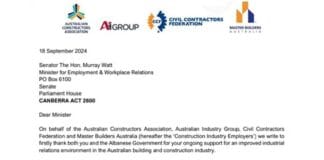Federal public sector workers are again ramping up their campaign to win better enterprise agreements.
In February the largest agency, DHS (including Centrelink, Medicare and child support workers), rejected a government-approved offer a second time, with an overwhelming 79.5 per cent voting “no”.
Many other agencies within the 152,000-strong Australian Public Service (APS) have also rejected sub-standard offers put to the vote by management. Government policy has imposed a cap on pay rises averaging 2 per cent a year combined with an effort to strip working conditions.
It is now 20 months since bargaining began, and more than two years since our last pay rise.
To call this unfair is an understatement. With Tony Abbott as Prime Minister and Eric Abetz as Employment Minister, the maximum pay rise was set at 1.5 per cent per year. They demanded the majority of conditions enshrined in the agreement, and protected by industrial law, be removed and placed in unprotected departmental policy—calling this a trade off for the pay increase.
After workers began industrial action they agreed to allow superannuation entitlements to remain.
The new team of Malcolm Turnbull and Michaelia Cash has increased the pay cap to 2 per cent and relaxed the attack on conditions slightly. Even so, the option even of forgoing a pay rise in return for maintaining conditions remains off limits.
Michaelia Cash has shown complete lack of respect for staff, claiming that public servants who wouldn’t accept these offers weren’t living in the “real world”. Her own Department of Employment responded by twice rejecting draft agreements.
In over 100 agencies, there have been nearly 50 ballots, more than half returning “no” votes. Those who vote “yes” are generally smaller agencies.
A war on the public service
Under Abbott 17,000 jobs were destroyed, increasing workloads for those who remain. This is not just a war on the workforce, but on all Australians who depend on public services.
Our services have widespread support in the community, as illustrated by the huge mobilisations to defend Medicare against Abbott’s GP co-payment. Decent working conditions for the people who provide these services are vital to maintaining them.
Financial Review journalist Laura Tingle’s recent Quarterly Essay Political Amnesia: How we forgot how to govern was another reminder of how cuts have undermined the public service under successive governments.
This is part of the neo-liberal agenda, putting the interests of business and narrow economic concerns above everything else. The budget update in December included further budget cuts in Arts, health and the Attorney General’s Department.
The government’s attack on public servants is part of attacking all workers. A recent report by right-wing think tank the Institute of Public Affairs argued, “wage increases in the public sector may place undue pressure on the private sector to match”.
Industrial action
We are now at a stalemate, with four agencies voting “no” twice. Some agencies have accepted poor outcomes, including Veteran’s Affairs and Health after second ballots. If bargaining drags on, the government will wear more agencies down.
The union campaign must match the determination of this vicious anti-worker government. The Australian Public Service Commission, which oversees the APS, is now headed by John Lloyd, former head of the ABCC, Howard’s construction industry police.
The union was hoping that successful “no” votes and low level bans and strikes would shift the government. There has been some movement, but nowhere near enough. And getting rid of the Coalition at the election is now far less certain.
Stronger industrial action is required to prevent the severe undermining of conditions that the Coalition has planned.
The size of the “no” votes indicates the widespread support for the union’s campaign, among members and non-members of the union.
The largest departments remain the most hostile. Three: Tax, DHS and Immigration and Border Protection (DIBP) together comprise about 40 per cent of the APS. In Tax 85 per cent voted “No”, in DIBP 91 per cent.
In the aftermath of their second ballot rejecting management’s offer, further strikes are planned in DHS . And there is continuing action by individual agencies, particularly the DIBP.
But we need public sector-wide action with the strongest departments striking together. There have been two days of strike action uniting a number of agencies. But we need to step the industrial action up further. In September the union leadership failed even to organise meetings during the well-supported half-day strike.
The largest department, DHS, has more than 50 per cent membership. In tax and DIBP, which have voted “no” by large margins, even a determined minority taking action would be effective. Other agencies would join such action.
This is the kind of action that can defend public services and working conditions built up through many decades.
By CPSU Delegates, Melbourne





